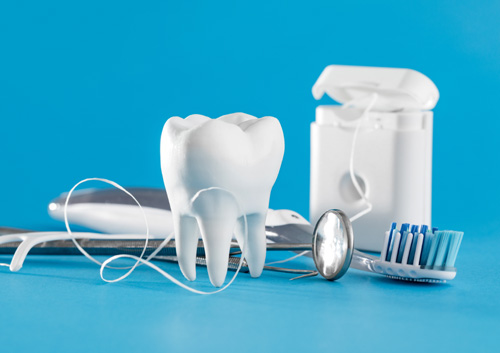The common belief is that the whiter a person’s teeth are, the healthier their teeth are. However, the shape and color of a person’s teeth are as unique as fingerprints. The different shades of teeth may be signs of poor oral hygiene, consuming overly acidic foods, or underlying medical conditions, but it often depends on the individual patient. Maintaining good oral hygiene, including regular brushing, flossing, and dental check-ups, is crucial for preventing dental issues and promoting overall oral health.
At Union City Oral Surgery Group, we understand the importance of individualized and customized care. Every patient and oral condition is unique and requires careful personalized care. Our team is dedicated to being there for our patients before, during, and after their procedures to ensure patient satisfaction. Contact us today to get started on your oral health and cosmetic goals.
4 Teeth Colors and What They Say About Tooth Discoloration
There are four common tooth colors that can indicate certain things about an individual’s health. The different shades of these colors can tell an oral specialist a lot about the patient’s overall dental health. The color of teeth can help distinguish normal teeth from those that are unhealthy. Regular dental check-ups and proper oral hygiene habits are essential to maintain optimal oral health.
1. White Teeth
Optimal oral health is far more complex than just having white teeth. White teeth may not have visible signs of tooth decay, but that doesn’t mean there aren’t areas hidden from view that may be left unattended because the patient believes their oral health to be good.
Without regular checkups, the bacteria behind those pearly white teeth can fester and quickly damage and discolor all their teeth. Furthermore, white teeth may indicate that the teeth are being overly cared for and cleaned, which can also negatively affect their oral health.
2. Yellow Teeth
Commonly misunderstood to be an indicator of poor health, slightly yellow teeth are often an indicator of strong and healthy teeth. Even for those who want pearly white teeth, slightly yellow teeth is the natural color of the dentin underneath the outer coating of the teeth (the tooth enamel). The enamel may also have a natural blueish-white hue, but bright white is not necessarily natural. Since the enamel is translucent, the slight yellow shade becomes clearer and results in that yellowish tint of the teeth.
However, excessively yellow teeth can suggest dental issues of disease or tooth decay. It is also possible that teeth that are a darker shade of yellow could mean that the teeth have been exposed to heavy straining.
3. Brown Teeth
Teeth turning brown may be the result of frequent consumption of colored beverages and food, or it may be the result of genes or age. Gum disease can also contribute to discoloration and is a serious condition that can lead to tooth loss if not addressed. Brown-colored teeth imply the teeth have gone through excessive straining and may be a sign of poor oral health or an underlying medical condition. Brown teeth are often caused by unhealthy lifestyle choices, such as smoking and repeated nicotine and tobacco use.
Brown spots on the teeth may suggest the build-up of plaque as well, which causes the formation of tartar. Over time, tartar hardens and becomes more permanent. Turning to a professional is often the best solution.
4. Blueish/Greyish Teeth
Some people’s enamel may be a natural hue of blue or gray, making their teeth’s natural color a blueish/grayish color. However, certain conditions can cause tooth discoloration, and the blueish/grayish color may be an indication of a serious dental problem caused by antibiotic exposure. Periodontal disease, which can result from compromised immune systems and chronic inflammation, may also contribute to tooth discoloration and other serious dental issues.
Tetracycline (an antibiotic medication) is known for changing the color of a person’s teeth to a blueish-gray. Furthermore, blue/gray teeth can be a sign of a dead tooth. The bluish hue of the tooth may also suggest that the nerves and pulp within the tooth have died.
Work With an Experienced Oral Surgeon Today
Maintaining oral health is crucial to a person’s overall health. At Union City Oral Surgery Group, we help our patients not only maintain their oral health but also reach their cosmetic goals to ensure they’re in love with their smiles. We know that each patient is unique and requires personalized care. Union City Oral Surgery Group is known for its patient care because we go the extra mile for our patients. Poor dental hygiene is linked to cognitive decline, especially in older individuals who have previously maintained good oral care. Start working towards improving your oral health and reaching your cosmetic goals today by completing our contact form or calling (201) 601-9262.


